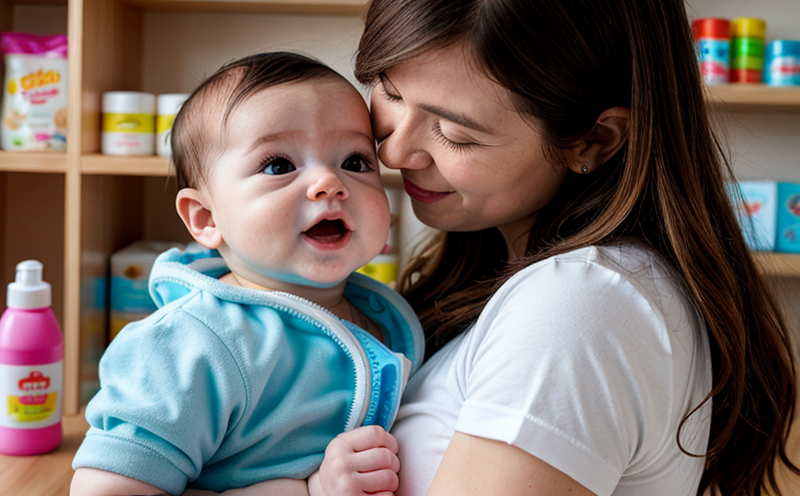Pesticide Residue Testing in Organic Baby Products
In today's era of heightened consumer awareness and demand for organic products, ensuring that baby products are free from harmful pesticide residues is paramount. This service focuses on the rigorous testing needed to guarantee that organic baby products meet stringent safety standards. The challenge lies not only in detecting trace amounts of pesticides but also in complying with global regulatory requirements.
The process begins with the collection and preparation of samples, which must be representative of the product being tested. Sample preparation can involve washing, rinsing, or drying steps depending on the nature of the baby product—be it a fabric diaper, teething toy, or bottle. Once prepared, these samples are analyzed using advanced analytical techniques such as Liquid Chromatography-Mass Spectrometry (LC-MS) and Gas Chromatography-Mass Spectrometry (GC-MS).
The target pesticides for testing in organic baby products include not only those commonly used on crops but also potential contaminants that might be introduced during processing or packaging. These can range from organophosphates, pyrethroids, and carbamates to newer classes of pesticides like neonicotinoids.
Our laboratory adheres strictly to international standards such as ISO 17025 for proficiency in the testing process. We use methodologies aligned with ISO/IEC 17746-3:2018, which provide a robust framework for pesticide residue analysis in food and feed matrices.
The significance of this service extends far beyond mere compliance; it ensures consumer trust and brand reputation. Parents who choose organic baby products do so with the hope that their children are exposed to minimal levels of harmful substances. By offering reliable and accurate testing, we contribute to the health and well-being of infants by eliminating exposure risks.
Our team of experts works closely with clients throughout the testing process, providing guidance on sample collection, interpretation of results, and corrective actions if residues are detected. This holistic approach ensures that our clients are not only compliant but also informed and prepared for market entry.
Why It Matters
The importance of pesticide residue testing in organic baby products cannot be overstated. Pesticides, while effective at controlling crop pests and weeds, can have adverse effects on human health, especially in infants whose bodies are still developing. Even trace amounts of pesticides can accumulate over time, posing risks such as developmental delays, neurological issues, and immune system disruptions.
For parents, the choice to use organic baby products is a reflection of their trust in brands that prioritize safety. They expect these products to be free from harmful contaminants, including pesticides. By partnering with us for pesticide residue testing, companies can meet this expectation and build long-term customer loyalty.
The legal landscape around pesticide residues in baby products is evolving. Regulatory bodies such as the US Environmental Protection Agency (EPA) and the European Union's Registration, Evaluation, Authorization and Restriction of Chemicals (REACH) have stringent guidelines that must be followed. Non-compliance can lead to product recalls, financial penalties, and damage to brand reputation.
Our laboratory ensures that all tests are conducted in accordance with these regulatory requirements. By providing accurate and reliable test results, we help companies stay ahead of changing regulations and maintain their competitive edge in the marketplace.
Applied Standards
The testing of pesticide residues in organic baby products is governed by a variety of international standards designed to ensure product safety. These include:
- ISO/IEC 17025:2017 – This standard ensures that the laboratory meets the requirements for competence in testing and calibration.
- ISO/IEC 17746-3:2018 – Specific to pesticide analysis in food and feed matrices, this guideline provides a framework for accurate residue detection.
- US EPA Method 1615 – This method is used by the United States Environmental Protection Agency for the extraction and clean-up of pesticides from various sample types.
- JECFA (Joint FAO/WHO Expert Committee on Food Additives) – JECFA provides guidelines for maximum residue levels that are safe for human consumption, which we strictly adhere to in our testing procedures.
These standards ensure that the results from our laboratory are credible and internationally recognized. They also provide a benchmark against which the safety of organic baby products can be evaluated.
Customer Impact and Satisfaction
Providing pesticide residue testing in organic baby products has a direct impact on customer satisfaction and trust. Parents who choose brands that undergo rigorous testing are reassured that their children's health is a priority. This can lead to increased brand loyalty and repeat business.
Our laboratory maintains high levels of customer satisfaction through transparent communication, timely delivery of results, and proactive consultation. We offer regular updates on the status of tests and provide detailed reports that include not only quantitative data but also qualitative insights into potential issues.
In addition to compliance with regulatory requirements, we focus on providing value-added services such as corrective action recommendations. If residues are detected above acceptable levels, our team works closely with clients to identify root causes and implement solutions. This proactive approach ensures that products meet both legal standards and consumer expectations.
Our commitment to customer satisfaction is reflected in the high retention rates of our clients. Many companies return to us for follow-up testing or additional services due to the trust they place in our expertise and reliability.





